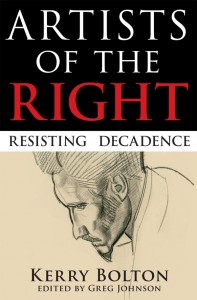“I am in fact a Hobbit.” — J. R. R. Tolkien
John Ronald Reuel Tolkien is a favorite author of New Left “hippies” and New Right nationalists, and for pretty much the same reasons. Tolkien deeply distrusted modernization and industrialization, which replace organic reciprocity between man and nature with technological dominion of man over nature, a relationship that deforms and devalues both poles.
But philosophically and politically, Tolkien was much closer to the New Right than the New Left. Tolkien was a conservative and a race realist. His preferences ran toward non-constitutional monarchy in the capital and de facto anarchy in the provinces, but he recognized that state control can be minimized only in a society with a deep reverence for tradition and a high regard for individual honor and self-restraint.

You can buy Kerry Bolton’s Artists of the Right here.
Many of Tolkien’s most fervent New Right admirers are neo-pagans. But Tolkien himself was a devout Roman Catholic traditionalist, albeit one with a deep love of pre-Christian myth, epic, and tradition. And although The Hobbit and The Lord of the Rings, with their many themes from Norse and Celtic mythology, resonate especially with pagans, the ultimate mythological framework of Middle Earth, particularly as expressed in the posthumous work The Silmarillion, is biblical in inspiration, with a creator God (Eru Ilúvatar), a devil (Melkor), a fall, and even a hint of the necessity of a divine incarnation to save creation.
In honor of Tolkien’s birthday, I wish first to draw your attention to several works on this website:
- Aquilonius, “Why the Left Hates The Lord of the Rings“
- Britannicus, “J. R. R. Tolkien: Master of Middle Earth” (German translation here, French translation here)
- William de Vere, “The Rangers of the North“
- Alex Graham, “J. R. R. Tolkien’s The Fall of Númenor“
- Alex Graham, “Tolkien and the Kalevala“
- Alex Graham, “Tolkien’s Last Book: The Fall of Gondolin“
- Robert Hampton, “Who’s Ready for Black Elves in Middle Earth?“
- Greg Johnson, “The Scouring of the Shire” (Translations: Danish, Portuguese)
- Greg Johnson, Hyperborean Home (French translation here)
- Tobias Langdon, “The Way of Weeds: Better Living through Botany“
- Trevor Lynch, The Fellowship of the Ring, movie review
- Trevor Lynch, The Two Towers, movie review
- Trevor Lynch, The Return of the King, movie review
- Trevor Lynch, The Hobbit: An Unexpected Journey, movie review
- Trevor Lynch, The Hobbit: The Desolation of Smaug, movie review
- Trevor Lynch, The Hobbit: The Battle of Five Armies, movie review
- Spencer J. Quinn, “Tolkien: A Review“
- Kathryn S., “‘For the Dead, They Travel Fast’: Sightings of the Phantom Horseman“
- Kathryn S., “Mortal Instruments: Mapping the Geomythologies of Western Fantasy,” Part 1, Part 2
- Fenek Solère, “The Unknown Soldier: Geoffrey Bache Smith, Tolkien’s Inspiration“
- Fenek Solère, “John M. Bowers’Tolkien’s Lost Chaucer”
- Fenek Solère, “Owen Barfield’s History in English Words“
- Fenek Solère, “Remembering Christopher Tolkien, 1924–2020“
- Will Windsor, “The Lord of the Rings: Return of the Meme“
For more background on Tolkien’s life and work, I recommend two introductory books, which are accessible even to teenagers: Leslie Ellen Jones’ Myth and Middle-Earth: Exploring the Medieval Legends Behind J. R. R. Tolkien’s Lord of the Rings and Bradley Birzer’s J. R. R. Tolkien’s Sanctifying Myth: Understanding Middle-Earth. The most thorough and serious biography and overall interpretation of Tolkien is Joseph Pearce’s Tolkien: Man and Myth.
For those who need no introduction, there is no better commemoration than to spend a winter evening snug in one’s own Hobbit hole reading the works of the man himself (or watching Peter Jackson’s masterly and inspiring movies of The Lord of the Rings).
* * *
Like all journals of dissident ideas, Counter-Currents depends on the support of readers like you. Help us compete with the censors of the Left and the violent accelerationists of the Right with a donation today. (The easiest way to help is with an e-check donation. All you need is your checkbook.)
For other ways to donate, click here.
Remembering%20J.%20R.%20R.%20Tolkien%3A%0AJanuary%203%2C%201892%E2%80%93September%202%2C%201973%0A
Share
Enjoyed this article?
Be the first to leave a tip in the jar!
Related
-
Notes on Plato’s Alcibiades I Part 1
-
Counter-Currents Radio Podcast No. 582: When Did You First Notice the Problems of Multiculturalism?
-
Popcult Humor from Wilmot Robertson: Remembering Wilmot Robertson (April 16, 1915–July 8, 2005)
-
Remembering Dominique Venner (April 16, 1935–May 21, 2013)
-
Remembering Jonathan Bowden (April 12, 1962–March 29, 2012)
-
Remembering Emil Cioran (April 8, 1911–June 20, 1995)
-
In Defense of Ethnonationalism
-
New Energy and New Projects: Announcing the 2024 Fundraiser — & What We’re Up To Behind the Scenes
